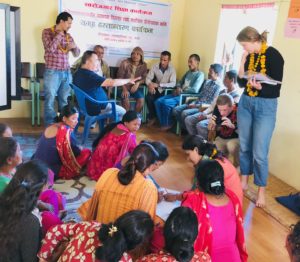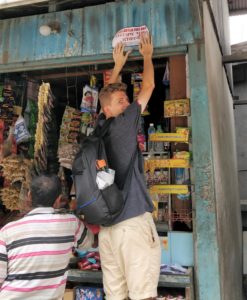July 2018 marked the deployment of our first group of “GFF Representatives” of the GFF HELPS programme. We received applications from over 50 candidates and selected 8 – the majority from the University of Auckland, where our Founder has strong ties and a long history as a major donor. These 8 Representatives attended an in-person or online briefing before being deployed in pairs to rural communities in need, which were to be their homes for the next six months. They showed tremendous courage, maturity and cultural sensitivity, forming good relationships with local stakeholders and initiating projects ranging from Digital Learning and Mobile Libraries, to Solar, Football Coaching, Recycling and Hygiene workshops. We learned a great deal about the rural contexts we were in and their unique challenges and strengths. We also learned the importance of clear expectations between ourselves and our partners, which will help to strengthen our work going forward. These are the highlights from two of our GFF Representatives who have recently returned home, Sophie and Joe, followed by more detail about what we did in each location.

Sophie administering a questionnaire to the women’s group in Kavre
“Spending the night in Kavre Village was the highlight of my experience in Nepal, it was amazing to see how the village operates and the community works. The way in which the people live and to hear their stories and share a meal with them. It is always a humbling experience to sit among people who have the bare minimum of necessities, who can smile and laugh with you and are willing to share what little they have with you. It was also enlightening for me to hear the big difference a small amount of learning can make to one persons life. Basic literacy is something that can be taken for granted when you live in countries like New Zealand, but the things you are limited in doing by being unable to recognise numbers or count are innumerable and take your independence away. Yet through all of their struggles, all of the difficulties, these women smile and laugh.” – Sophie Jones-Williams, GFF Representative 2018, India and Nepal.

Joe officially declaring an area a Child Labour-Free Zone in Kalimpong, India
“I learnt to appreciate that on the whole people are generally good and want to do what they can to help others. Almost every person I met during our stay was incredibly welcoming and couldn’t do enough to help us be comfortable in their country. Whenever I did something to help someone such as running a football training session, they couldn’t be more appreciative to me for giving up my time to help them. It can be easy to forget that most people are good people that want to make the best of themselves and others around them, no matter what their background may be.” – Joe Fisher – GFF Representative 2018, India and Nepal.
Philippines
We worked alongside a local project, the Yolanda Aklan Reconstruction Programme, who facilitated our introduction to local schools and community leaders. We visited local schools and developed good relationships with the teachers, principals and department heads and put forward our ideas for the schools. We ran a pilot of our Digital Learning project, where we use inexpensive tablets as learning aids to supplement schools with few resources. We learned some valuable lessons for how to adapt this project in different contexts.
We piloted our Village Solar Project; developing a model for providing solar panels in areas difficult to access. These households do not have access to the grid and rely on harmful kerosene for lighting, which causes fires and respiratory illnesses. Our GFF Representatives ran Reading Workshops in four schools and started a Mobile Library to enhance language development.
Vietnam
In Vietnam we ventured North to identify a suitable rural community to work with and found a severe lack of sanitation infrastructure. We built 10 toilets and two washrooms for a new school that will service 500 children from the surrounding villages. In the South we partnered with a local NGO and sponsored 10 children through their schooling. We also identified a rural community and are building our connections there for future work.
India and Nepal
In India we partnered with one of our grant recipients, the Bal Suraksha Abhiyan Trust, and worked alongside them in their child labour programmes and started a football coaching course which continues to flourish in our absence. We faced some visa challenges and so decided to move our Representatives to Nepal, where we had identified a very promising women’s education and empowerment programme, run by a local NGO, Child Development Society. We visited their women’s groups and found good opportunities for partnership. You can read Sophie’s research report and see Joe’s documentary about this work here. We also introduced recycling to a local school and ran a football club.
This first round of our HELPS programme was illuminating; we were able to test out our internal processes and a lot of project ideas to see which gained traction. This has strengthened our programme plans and operations, enabling us to enter the field in 2019 stronger, more focused on our objectives and able to deliver larger impact. We are under no illusion that there is still a lot of learning to do, and we are looking forward to 2019 and seeing how this programme develops.
GFF Team.
